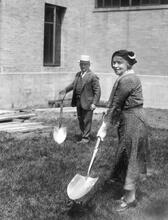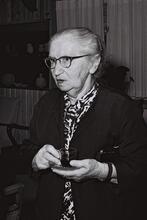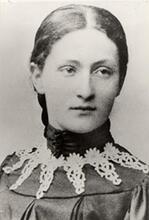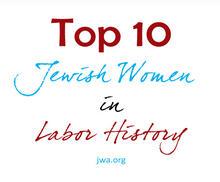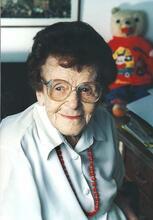Aliza Greenblatt
Deep love for the Jewish people informed the life of Aliza Greenblatt, an American Yiddish poet and an early, committed leader in Zionist and Jewish women’s organizations. Greenblatt was among the first to organize the American Jewish community and raise funds toward the establishment of a Jewish national home. She established a local chapter of the Zionist Organization of America in Atlantic City. She also became a successful fund-raiser for the Jewish National Fund, an active Hadassah member, and national president of Pioneer Women. In her later years, she focused more on writing, publishing five volumes of poetry and an autobiography. Her work appeared all over the Yiddish press and many of her poems were also set to music and recorded.
Deep love for the Jewish people informed the life of Aliza Greenblatt, an American Yiddish poet and an early, committed leader in Zionist and Jewish women’s organizations. Greenblatt was among the first to organize the American Jewish community and raise funds toward the establishment of a Jewish national home. Many of her poems, which were widely published in the Yiddish press, were also set to music and recorded.
Upbringing and Early Zionism
Born Aliza Waitzman in September 1885 in Azarenits, Bessarabia, Aliza and her two sisters were sent to Lit. "room." Old-style Jewish elementary school.heder until their father’s death in 1893, because they had no brothers. Their mother remarried five years later. In 1900, Aliza, her stepfather, and three stepbrothers came to the United States. They settled in Philadelphia, where Aliza worked in the garment industry. Four years later, when they could afford to send for her mother, Aliza stopped working and received tutoring in English at home. In 1907, she married Isidor Greenblatt, a fellow Bessarabian immigrant, and they had five children: Herbert, David, Gertrude, Marjorie [Guthrie] and Bernard.
Shortly after the birth of her first child, Greenblatt began her charitable and organizational work. The family moved from Philadelphia to Atlantic City, where Greenblatt served as president of the local chapter of the True Sisters and organized the Atlantic City branch of the farband, a Yiddish socialist charitable organization. After the 1917 Balfour Declaration, Greenblatt, finding no local Zionist group, established the Atlantic City branch of the Zionist Organization of America. In time, she became a successful fund-raiser for the Jewish National Fund, an active Hadassah member, and national president of Pioneer Women.
In 1919, Greenblatt and her husband considered moving to Palestine. To prepare, Isidor spent several months there in the spring of 1920, trying to establish a fruit-canning factory. His absence, however, led to the failure of their business at home and the postponement of their dream of emigrating. Thirty years later, their fortunes improved, and they were able to try again. However, Aliza was so unhappy with the material conditions under which they lived that, after struggling for a year, they returned to the United States for good. They moved to New York to be closer to its Yiddish literary community. Until his death in 1960, Isidor devoted himself to promoting investment in Israel.
Writing and Legacy
In her later years, Greenblatt focused on writing. She published five volumes of poetry and an autobiography, Baym Fenster fun a Lebn [A window on a life], all in Yiddish. Her poems and songs appeared in Yiddish newspapers in the United States and Israel, and were recorded by Theodore Bikel, among others. Fellow poets Jacob Glatshteyn and Avram Reisen praised her work. For many years, Jewish women’s organizations sponsored readings of her poetry across the United States. She died in New York on September 21, 1975.
In the American Jewish community, Aliza Greenblatt was a pioneer in her activism for a Jewish national home. As an organizer and fund-raiser, she mobilized support in the United States for the establishment of the State of Israel and fought to involve Jewish women in that cause. Her poetry and autobiography chronicle her life, from its origins in an impoverished (Yiddish) Small-town Jewish community in Eastern Europe.shtetl in Eastern Europe to a position in the middle-class Jewish community of New York. Her work adds an important Yiddish voice to the history of twentieth-century American Jewry, and her life provides an exemplar of the activism of American Jewish women.
"Kholemen khaloymes" (Aliza Greenblatt - Solomon Golub) performed by Eléonore Biezunski - 4.27.2020
Selected Works by Aliza Greenblatt
Baym Fentster fun a Lebn [A window on a life] (1966)
Ikh un Du [You and I] (1951)
Ikh Zing [I sing] (1947)
In Sigate baym Yam [In Seagate by the ocean] (1957)
Lebn Mayns [My life] (1935)
Tsen Lider mit Musik [Ten poems with music] (1939)
Shavelson, Susanne. “Anxieties of Authorship in the Autobiographies of Mary Antin and Aliza Greenblatt.” Prooftexts 18, no. 2 (May 1998): 161-186.

